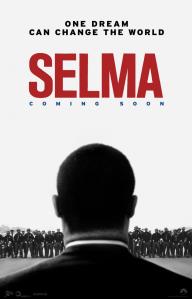Selma, Paramount Pictures (2014)
 In his book about the motion picture business, Adventures in the Screen Trade¸ screenwriter William Goldman describes, among other things, the life of an executive at a major motion picture studio. Typically former Hollywood agents and managers, studio execs have remarkably short half-lives in their positions for one simple reason: nobody knows anything.
In his book about the motion picture business, Adventures in the Screen Trade¸ screenwriter William Goldman describes, among other things, the life of an executive at a major motion picture studio. Typically former Hollywood agents and managers, studio execs have remarkably short half-lives in their positions for one simple reason: nobody knows anything.
This is Goldman’s ultimate thesis, that nobody knows anything of what movies people will go see one, two, or up to five years down the road, which is when most ideas for movies begin to germinate. It’s the studio exec’s job to play astrologer and attempt to predict what movies are going to make money, but it rarely works. When it does the results can be tremendous and that’s what makes people in Hollywood rich and powerful and envied. But for every Avatar or Titanic or Frozen that gets made and makes a billion dollars you’ve got a hundred movies like Stealth, Heaven’s Gate, Speed Racer, Town and Country, The 13th Warrior, Mars Needs Moms, Sahara, The Adventures of Pluto Nash, The Alamo, and Cutthroat Island, which – unadjusted for inflation – lost a combined total of $1.1 billion.
It’s because of this extreme potential for failure that most movies produced now fall into one or more of three “safe” categories: comic book movies, remakes, historical dramas. By comic book movies Goldman means any movie with a clearly defined hero who is above reproach, a villain who is beyond remorse, and absolutely no alternate outcome than the obvious. Remakes are safe because they already have a built in audience, potentially. But it’s the last category that our film today finds itself in: the historical drama.
Selma, directed by Ava DuVernay (for whom this is only her second feature film as director) focuses on the events preceding the famous protest march for voting rights led by Martin Luther King from Selma, Alabama, to the capital in Montgomery. The film features a lot of fine acting by a lot of British actors (including the chameleon Tim Roth as reviled Alabama governor George Wallace) doing a lot of solid American accents. Unfortunately, it also features a horrendously poor structure that makes the film’s two hours and seven minutes feel like Boyhood’s two hours and forty-five.
Scenes of intense violence and tragedy are followed by uninteresting history or civics lessons, followed by more violence and tragedy, followed by torturously slow scenes depicting martial dysfunction, then more V&T, then plot exposition… Etcetera. A familiar rising action, climax, falling action plot structure is not to be found and it is sorely missed. The filmmakers attempted to manufacture one, however, but did so at the cost of accuracy. Their attempt to provide a turning point for the film came from the relationship between King and President Lyndon Johnson.
In the film, Johnson is more interested in his War on Poverty than in King’s voting rights issue and refuses to lend his support to the cause and to the march. The story even goes as far as to show Johnson actively obstructing the cause, ordering FBI surveillance and interference. Johnson’s change of heart after meeting with the astoundingly racist Governor Wallace is the closest thing the film has to a turning point, though it comes very late in the story.
Those who were present for these events say that this was the only inaccurate aspect of the movie; that otherwise it was right on point. Which is nice to know. It explains the films poor structure. The events of the Civil Rights Movement probably didn’t play out like a Hollywood movie. Heroes are not so clean cut (King himself was a notorious philanderer, a fact that the film did address), and a villain’s motives are rarely so simple (though you’d never know that from the remarkably obtuse dialogue of the film’s racists). The efforts of King and others were torturously long, meticulously planned protests that did not possess the familiar plot arc of a movie. Real life within great struggle is simply far too messy for that.
This is all great news for studio execs, though. Remember, they’ve got statistically short shelf lives, more than anything they are trying to save their jobs and a wonderful excuse for why a movie didn’t open or didn’t play well is to blame the source material. Doing so insulates them from blame and deflects it not on another person, but on history. And who can argue with history? This is one of two reasons, Goldman says, that most movies made are based on some kind of source material. (The other reason, he says, is that’s really, really hard to come up with something entirely new.)
So while I applaud the producers and director of Selma for being as true to the truth as possible, I can’t say that in doing so they made a great film. They made a (mostly) honest movie about a period of American history that is marred and important and it will be a wonderful tool for social studies classroom all over the country. Though little else.